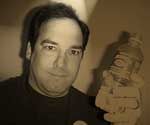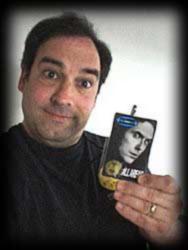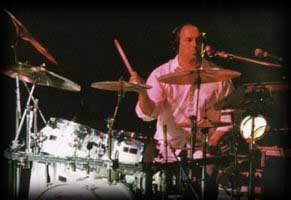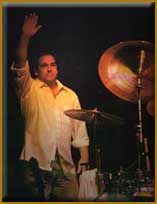
|
||||||
| Interview with Jon "Bermuda" Schwartz -The Fifth Avenue Theater 2/25/00
SD: How long have you played the drums and how did you get interested in drums?
SD: There's a Seattle drummer, Don Bennett, which has a lot of vintage kits that are in really good condition.
SD: So did you start in Chicago?
Bermuda: Weird Al is first call. I'm not really pursuing any other stuff right now, but I probably could. I've done some studio work... nothing that's really ever escaped; a lot of demo stuff, a lot of country stuff. You know, oddly enough, in L.A., country is the one thing you can actually get paid for! It's all "2 and 4" to me, so I don't really care what the bass line is doing or any of that stuff. If I can just play 2 and 4 and be Jim Keltner for a night, I'm happy. SD: When did you release this last Album? Bermuda: This came out in June, 1999, and went gold fairly quickly. It's kinda cruising a long a bit; it was on the charts in the top 20 so, not bad. The album before that was on the charts for like 53 weeks. They sell alright. Out of 10 original albums (which is not counting greatest hits compilations), 8 of them have gone gold and 4 or 5 of those have gone platinum. We've sold about 11 or 12 million albums worldwide. Over the years we've done really well. We have been releasing albums and touring since '83 so, it's been pretty good. SD: So is the show still challenging to you? Bermuda: I still enjoy it, it's still a fun show for me... yet I'm far from being on autopilot. I've got so much going on up there, and I can't sleep through the show. I even sing, but I'm not very good; I'm only used for parts that are not melodic! SD: Describe your typical workday with AL? Bermuda: On tour, we usually travel to the show happening that day, I may get some time in the morning at the hotel, go online, answer some emails... Once at the venue (um, we are at that point where I don't set up my gear,) I may do some maintenance (I don't ask the crew to polish my cymbals, I don't touch them either. It would drive me nuts, you can end up doing that everyday!) maybe change heads... we don't do sound check anymore, this is all done by the sound and lights people. We have dinner, I may go online again, and we do the show. When we are done, we walk away and go wherever we go, meet guests or go back to our hotel or get on the bus and head to the next show.
Now in the studio, preparing for an album is a whole different animal. When we're doing the parodies, we know what the original sounds like; there's not really any production issue. You know, if it's a machine and there are certain sounds, that's what I do - I program it, get certain sounds, create samples, whatever I need to do. If it's a live part, I try to approximate the cymbal sound (I have about 60 or 70 cymbals at home that pretty much can do whatever I need them to do) and I always bring about 5 or 6 snares into the studio... wood, metal, fiberglass (like the Impacts,) thin, deep, and a couple extra heads. Going in, I know what's supposed to be accomplished. I do all the pre-production on my own and write out the parts. If it is something we are playing live, we have to do the stuff 100% like the original. Soundwise, if we can get 99% of the production value, we're doing good. As for playing the parts, something we really can control, it's got to be 100% - 99% isn't good enough. Every grace note has to be there, every dragged beat, every slowdown, every speedup, every sloppy fill, every stick click or rim click... it's got to be in there. And it's very hard to do that... to go in and sort of "backwards engineer" the original songs. The original players go in, and they're not thinking about that... they're just playing a song. If they do another take of the song, it's like a different thing. Bermuda: I write it down if there are things I need to work on. I work out specific fills that I do need to practice, but for the most part it's for a reference so that I know what I'm doing; so I don't have to "remember" how this fill is different from that one, so I don't swap the fills. Al wants everything exact, and the band is that way, too. It's a very precise process that takes patience. But when you hear the song come on, you really think it's the original... of course, until the vocals hit. SD: What are your experiences with the labels? Bermuda: We were on Scotti Brothers since 1983. We did about a 1-month tour in a station wagon, as part of the Dr. Demento show; we did this a few times until "Eat It" came out the next summer in '84. But the label was good to us. These two guys, Ben and Tony Scotti, were major promotion kinda guys and they cooked up their own label. They had a rather dubious artist roster... James Brown (Living in America) except not any of the cool catalog stuff or hits, Petula Clark (again, none of the hits,) and David Cassidy. Scotti Brothers finally sold out to Volcano Records, the music division of Q-Prime, run by Cliff Bernstein and Peter Mensch (who have clients like Madonna.) Their pet label is Volcano. They gave Al his own "imprint" - Way Moby - so Al's current label is Volcano/Way Moby/Zomba/BMG. (Zomba's an umbrella over a whole bunch of independent labels, distributed by BMG, and Backstreet Boys and Britney Spears are in their roster.) Bernstein and Mensch very "heavy hitters" and can get things done. We have a much bigger worldwide presence then before with Scotti Brothers (which basically was, whoever wanted to distribute their product could... if they wanted... and if not, that was apparently okay too!) BMG has clients around the world. We have a gold album in Australia as well as product released in England, Japan, and the Netherlands. I don't really understand how the "Euro" market is, but I know we have a couple of things released there. SD: What do you think of Strictly Independent labels for bands? Bermuda: You know, with the Internet and the reach that it has, anybody can do anything. You probably don't need a major distributor or label if you're basically selling off the net, and if you can be successful at that (if you can get enough people to come to your site and if you can get enough people to enjoy your music.) If you can't do that, then the big guys can't help you anyway. But I think there are a lot of people looking at the Internet for things and MP3.COM is a big proponent of independent artist, which is great; if the labels don't want to do that stuff, then they shouldn't complain about MP3.COM or outlets like that! If they are not going to do it, then somebody else should... which I think is great, because a lot of people didn't have that type of opportunity before (the Internet.) I think it's a cool thing. SD: How did you get started with computers? What's your background? Bermuda: I kind of grew up with computers. At this point, I've been using computers for about 15 years. In 1992, I got my own computer, my first. It was a 486/33 with a local bus (which meant the video was sort of fast) and 4 megs of RAM, which was more than you needed to run Windows 3.1, and 120 meg hard drive, which actually took me a long time to outgrow, because we didn't have giant applications then. But I just sort of took to it (computers) and found myself one day writing web pages. SD: Is that when you started creating the Weird Al page? Bermuda: Yeah, I just started a page. One day after about 2 ½ years, I said "I think we should probably grab WeirdAl.com." The label was trying to do a page but they didn't have a clue and didn't update it, so one day Al's manager proclaimed mine the official Weird Al site. So we grabbed WeirdAl.com, made the site a real site, and a short time later I said "seeing that now we have weirdal.com, and I've already started doing web pages for other clients, I have to assign some value to what I'm doing, and I'm going to have to start charging you." They said "okay" and I thought "Aw, I've been doing this for 3 years for free... great!" But you know, it was just a hobby and I was learning and they shouldn't have been paying me for that early stuff because it was really hokey by comparison. And the site is still very simple, and it loads very quickly. I assume that everybody out there has just as bad of a connection as I do, so if the site works for me I know that it works for others. I keep graphics to a minimum unless an image is required. I keep the sizes small, I keep the pages mostly text, and I use tables and some other attributes of a browser to assign colors and things instead of using graphics. I know what fonts are native to Windows and Macs. I will be very glad when everyone has fast connections and I can do other things on there and they'll load quickly. But I think for a few more years, I'm just going to keep things simple, and I know people appreciate that. They say "your sight isn't flashy, that's okay. It's the best site out there, you have a huge amount of information, easy to navigate, loads quickly..." Well, those are the hallmarks of a good site, right?

SD: Whom do you rely on for content? Bermuda: I have a whole FAQ on endorsements that I wrote for newsgroup rec.music.makers.percussion as far as how that works. I've been playing Impact drums for 15 years, been using DW pedals since 83, Sabian cymbals since 93. Heads... technically I'm a REMO endorser but I'm trying a bunch of stuff. . Snares, I'm trying a bunch of stuff. I have a BEAR head on there, Aquarians… I like Remo and Aquarians on toms I have been using Mainline sticks for 5 years a lot longer then he has been advertising. I was one of the early guys to get in there. Love those. My thing, especially on the road, is I don't like to replace things if possible. I don't like sticks breaking and the same with heads. I really don't like to change heads every 2 or 3 shows if I can possibly avoid it. So I use the Aquarian, the high energy one with the series of patches. They'll last me about 50 shows and they don't break but they tonally get choked up. And don't have any bottom to them and the soundman will say, I think its time to change your head. And the Bear head will last about 15 to 18 shows, which is pretty good. The Remos I have to change them every 2 or 3 shows and I hate to have to do that. I'm not one of those drummers that mooch gear. I've got a lot of inside knowledge of Impacts marketing, and DW, Sabian cymbals I'm friends with those guys. It's nice to know these guys on a different level. So, in terms of the endorsement thing, I've got sort of a different perspective than a lot of players have. But I worked all of those up myself and I only endorsed things I was using. If I didn't like the product, I wouldn't use it. You can give me all the free stuff in the world but if I'm not having a good time with it, I'm not going to play it, not even for free. And I've been through that with sticks and other drums before. I think I'm a Kurzweil endorser as well. Ruben, Al, and I use Kurzweil equipment. The endorsement thing varies also. Some of my deals are free gear, and some are nicely discounted gear. An important side of this is the support they give you. If you need something you can usually call the company and they will get it to you. You don't have to go looking for it in drum shops. The support is very important because a lot of times I will be somewhere where there isn't a Trading Musicians or a Jerry Garcia Drum Shop, which I was at the other day, or a Guitar Center or a Sam Ash or a Mars. Although I still shop locally for heads when I'm on the road, it's nice to have a relationship with companies... and it is | ||||||












 The decor of Seattle's Fifth Avenue Theater reflects a city historically known as "the gateway to the Orient". We rubbed Buddha's belly for good luck as we enter the lobby and immediately felt the positive fortune of luck in the air. We were here to interview the driving force of Weird Al's band, Jon "Bermuda" Schwartz. After enjoying an incredible Weird Al show our newly acquired luck lead us to an aftershow gathering and offered us the opportunity to sit down with Bermuda to talk drums...
The decor of Seattle's Fifth Avenue Theater reflects a city historically known as "the gateway to the Orient". We rubbed Buddha's belly for good luck as we enter the lobby and immediately felt the positive fortune of luck in the air. We were here to interview the driving force of Weird Al's band, Jon "Bermuda" Schwartz. After enjoying an incredible Weird Al show our newly acquired luck lead us to an aftershow gathering and offered us the opportunity to sit down with Bermuda to talk drums... 
 On the parodies, we don't have the luxury of creating like that. We have to re-create a song exactly. And I don't like... okay, I do like to talk about David Grohl because I've done two of his things now. Regardless of what you think of him as a drummer, his parts are very hard to re-create (I don't know if that's good or bad.) When we did "Smells like Nirvana" back in '92, I went to Al and said "do you want me to play this right, or do you want me to play it like it is on the record?" because it's very loose and it's very sloppy, not just from a timing perspective but from a playing perspective. That kind of sloppy boogaloo sort of thing that he does on that... it's perfect for the song, but it's like, are we really doing it like that, or do we want to, ya know, sterilize it a little bit? Al said "no, I really want it to sound like that." It was very hard to do that. Now, we come back and do "It's All About The Pentiums" (It's All About The Benjamins), our version of which is the "rock" version with Rob Zombie, and David Grohl is playing drums and guitar on top of it as well, with a machine thrown in, on top of the original Puff Daddy track. Grohl's drums were pretty loose against the track. We did the song straight, like it was probably intended to be, and we knocked it out quickly and got some great production on it, too. Sometimes I can knock stuff out in one take, but most of the time I would say I do 5 or so takes on average.
On the parodies, we don't have the luxury of creating like that. We have to re-create a song exactly. And I don't like... okay, I do like to talk about David Grohl because I've done two of his things now. Regardless of what you think of him as a drummer, his parts are very hard to re-create (I don't know if that's good or bad.) When we did "Smells like Nirvana" back in '92, I went to Al and said "do you want me to play this right, or do you want me to play it like it is on the record?" because it's very loose and it's very sloppy, not just from a timing perspective but from a playing perspective. That kind of sloppy boogaloo sort of thing that he does on that... it's perfect for the song, but it's like, are we really doing it like that, or do we want to, ya know, sterilize it a little bit? Al said "no, I really want it to sound like that." It was very hard to do that. Now, we come back and do "It's All About The Pentiums" (It's All About The Benjamins), our version of which is the "rock" version with Rob Zombie, and David Grohl is playing drums and guitar on top of it as well, with a machine thrown in, on top of the original Puff Daddy track. Grohl's drums were pretty loose against the track. We did the song straight, like it was probably intended to be, and we knocked it out quickly and got some great production on it, too. Sometimes I can knock stuff out in one take, but most of the time I would say I do 5 or so takes on average.